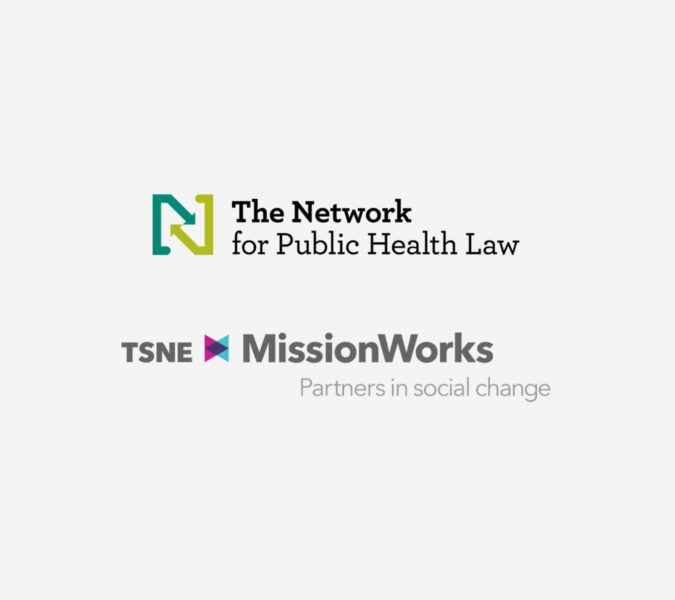
Job Opportunity: Public Health Law Clerk
Network NewsThe Network is hiring Public Health Law Clerks to work with its Mid-States Region Office and with its Health and Racial Equity program. All work will be performed remotely.

The Network is hiring Public Health Law Clerks to work with its Mid-States Region Office and with its Health and Racial Equity program. All work will be performed remotely.

Dissemination of data disaggregated by race and ethnicity is an important step in advancing health equity. However, the public dissemination of datasets that include race and ethnicity raises important legal considerations around privacy, primarily around re-identification. Re-identification refers to the ability to use data from a de-identified dataset to identify individuals. Modifications to the released data can reduce re-identification risks while maximizing the data’s utility.

It is with great excitement and gratitude that I write to you as the new National Director of the Network for Public Health Law. I am taking on a role that was previously held by the brilliant Donna E. Levin, under whose leadership the Network has become an essential partner for public health. I feel extremely fortunate to join a team of eminent leaders and dedicated staff at the Network who are tireless in their pursuit of advancing law and policy that promotes public health and health equity.

According to the National Council on Problem Gambling, approximately 85 percent of U.S. adults have gambled at least once in their lives. States benefit from revenue generated by legalized gambling and those funds are often used for specific public good, like education. However, States must recognize another reality, that problem gambling harms individuals and communities (problem gambling has the highest rate of suicide of any addictive disorder) creating a public health challenge that requires funding to prevent or ameliorate.

It’s well established that individual and structural racism has led to disparities in the quality of and access to health care in the U.S. Recent studies show how medical records are another avenue through which bias and discrimination negatively impact care and further perpetuate racial inequities in delivery. Some states and organizations have taken steps to prevent racial inequities from percolating within medical records by issuing recommendations, publishing guidelines, or by mandating implicit bias training for those in the health care field.

Dr. Vineeta Gupta, a maternal and child health physician and human rights lawyer with three decades of experience in clinical and public health, health justice and equity, and organizational development, has been named the new National Director of the Network for Public Health Law (Network). In this role, Dr. Gupta will serve as chief architect and advocate for the Network’s continued growth and impact.

Creating a government that is truly for everyone requires laws and policies that eliminate racial and ethnic disparities and improve outcomes for all. As 2023 state legislative sessions approach, it is important to look back at trends over the last few years in legislation impacting health and racial equity to understand how states are trying to address the health impacts of racism, be accountable for commitments to address racism as a public health crisis, and ensure the conditions for all people to thrive. State legislation is one important mechanism for creating the infrastructure for healthy communities. We assessed legislation for the past two years, looking at 447 bills. Below, we discuss two important trends.

The Lancet Countdown’s annual report, “Tracking Progress On Health and Climate Change,” highlights the immediate need for a health-centered response to climate change. Recognizing the need to build a shared understanding of how public health law can and should help mitigate climate change, presenters and attendees at the Network’s first-ever Climate and Health Equity Summit, held in Minneapolis in October, highlighted numerous legal and policy strategies to mitigate climate change and lessen its impacts on human health.

As public health is increasingly moving toward cross-sector data sharing to better tailor public health interventions and address health inequities, comprehensive privacy laws are receiving more legislative attention. The American Data Privacy and Protection Act (ADPPA), introduced in June 2022 and amended in July, is an example of a pending federal bill that may have implications for public health data collection and sharing.

The Network is seeking a Public Health Staff Attorney to work with its Mid-States Region. This is a remote position. This position will assist the Network’s Mid-States Region to provide legal technical assistance, conduct training, develop tools and educational materials, and facilitate opportunities for networking and peer assistance on a wide variety of public health law topics. The position will focus on two key areas: 1) legal issues regarding collecting, sharing, and protecting data for public health purposes, including addressing determinants of health and promoting racial and health equity, and 2) legal issues regarding public health authority.

In light of the current climate of eroding trust and falling investments in public health, a critical question has emerged: How do we strengthen public health advocacy at local, state, and national levels? In this Q&A, the authors of the study, Fighting for Public Health: Findings, Opportunities, and Next Steps from a Feasibility Study to Strengthen Public Health Advocacy discuss the myriad tensions surfaced by public health leaders interviewed for the study, and opportunities for a way forward.

The Network is seeking a Public Health Senior Attorney to help advance its health and racial equity work. While the position will work on a wide variety of public health law topics, it will primarily focus on addressing health and racial equity through law and policy. Projects may include research and analysis of racism and other forms of structural discrimination in law and policy, as well as strategies, frameworks, and tools that can be used or implemented by partners engaged in health and racial equity work. This position is expected to be fully remote.